#Hitler assassination attempt
Text
Both had been planned by Germans who were convinced that the war could not be won and who wanted to seek peace then, at a time when the eastern front between the German and Russian armies still lay mostly within Russia's borders.
"Guns, Germs and Steel: A Short History of Everybody for the Last 13,000 Years" - Jared Diamond
#book quote#guns germs and steel#jared diamond#nonfiction#july 20 1944#1940s#ww2#world war 2#second world war#Hitler assassination attempt#germany#russia#eastern front#German army#Russian army#berlin uprising
1 note
·
View note
Text
Today, Nov 8th, is the anniversary of the failed assassination of Adolf Hitler. Did you know that? In 1939 Georg Elser tried to blow up Hitler, Göring and Goebbles with a time bomb in Bürgerbräukeller Munich (the same where the failed putch in 1923 took place). The bomb worked perfectly, but due to a change in plan the intended targets left early. 7 other nazis and one waitress died, more than 50 injured. The blast was audible through the live radio broadcast.
Georg Elser was caught, tortured and imprisoned without trial. On April 9th 1945 he was murdered in Dachau concentration camp. He was 42.
He had worked alone.
It could have all ended then and there.
When we remember Kristallnacht 1938 tomorrow, think of that brave, lonely man who tried to stop it all.
Punch a nazi and pour one out for Georg Elser.
#georg elser#killing nazis#assassination attempt#nazi germany#adolf hitler#blowing up nazis with time bombs#remembrance#resistance#german resistance
2 notes
·
View notes
Text
Margot Wölk: Taste of Death-Hitler's food taster.
Maniacal dictators tend to develop a sense of paranoia throughout their reign, as was the case with Adolf Hitler.
Hitler was a vegetarian, it is not precisely known when he became vegetarian but certainly throughout WWII. Allegedly he once commented that he didn’t like to eat lobster because he thought it was cruel how lobsters were cooked alive.
Margot Wölk was a former German secretary. At…

View On WordPress
#Assassination attempt#Food taster#Germany#History#Hitler#Holocaust#July 20 plot#Politics#World War 2#world-war-ii
0 notes
Text
Happy anniversary to George Elser’s attempted 1939 assassination of Adolf Hitler. Elser, a carpenter, over the course of a year devised and implemented a plan to detonate a time-bomb in the pillar behind Hitler during his annual commemorative speech of the beer hall putsch. Had he not unexpectedly cut his planned two hour speech short by an hour, the detonation would have surely killed him. Elser seems to have acted alone, undetected, and was subsequently imprisoned until close to the end of the war in the hopes of staging a show trial, before his summary execution instead once Germany’s defeat was imminent
May we all be so courageous and resourceful when the opportunity presents itself
731 notes
·
View notes
Text
We are told that most Palestinians do not support Hamas.
Very well.
Where then are the large scale Palestinian protests demanding Hamas release the abducted hostages - children, toddlers, grandparents, civilians - immediately and unconditionally?
Where then is the sole Palestinian protester standing in Times or Trafalgar Square with a sign that says “Not in My Name”?
Where is the one Palestinian intellectual who will write an op-ed expressing deep shame that acts of the greatest cruelty in human history were carried out in the name of “Free Palestine” and “From the River to the Sea”?
If the PLO, Fatah and Palestinian Authority represent moderate Palestinians, where is the outcry? The horror? The heartfelt denunciations? Why must international pressure be fruitlessly brought to bear to try to elicit even a pale shadow of them?
If Hamas is not supported in Gaza, where then is the Palestinian in Gaza who will come forth with information about the hostages?
Even in Nazi Germany, when some Germans understood that Hitler was bringing disaster on their country, there were those who attempted to assassinate him. Where are the Palestinians in Gaza who will take action against Hamas?
And why is it that the instinctive response of so many to these questions is to make excuses as to why not even one of these things should be expected of any Palestinian anywhere?
We finally have courageous Arab and Muslim inspirational voices expressing those feelings and ideas. Why then is so little expected of Palestinians?

224 notes
·
View notes
Text
i learned that in an attempt to assassinate Hitler, a Nazi officer hid two time bombs in his jacket and led Hitler on a tour of a museum. Hitler raced through the museum and left before the bombs exploded, so the officer had to rush to the bathroom where he defused the bombs "at the last second." (x)

90 notes
·
View notes
Text
Albert Speer

These are some facts and curiosities about Albert Speer, the Fuhrer's architect:
He was born in March 19, 1905.
He spent his youth in the Schloss-Wolfsbrunnenweg, the luxurious family home in Heidelberg, and cultivated a wide range of interests, including skiing, mountain excursions, rugby and, above all, mathematics, a discipline towards which he had a fervent passion.
However, due to his father's opposition, Speer ultimately chose to follow in his uncle's footsteps and study to become an architect.
After studying at the University of Karlsruhe, he moved to Munich, where he studied at the Berlin Institute of Technology, under the guidance of the famous architect Heinrich Tessenow.
During his university years Speer never adhered to any specific faith or political opinion.
This substantial "apoliticality" ceased during his discipleship at Tessenow, when Albert was persuaded by some of his students to participate in a Nazi party demonstration
Speer came into contact with Hitler in 1933 through the intercession of Rudolf Hess, by whom the architect was commissioned to design the apparatus for the Nuremberg rally that year.
Despite some initial doubts, the project met with the sympathy of the Führer and, above all, of Joseph Goebbels, who asked him to renew the Ministry of Propaganda.
An immediate understanding was established between Speer and Hitler: the Führer, in fact, was looking for a young architect capable of giving life to his architectural ambitions for a new Germany and therefore immediately included Speer in his closest circles.
Upon Troost's death in 1934, Speer was chosen by Hitler to replace him as chief architect of the Party.
In 1942, after the death of Fritz Todt (which occurred in a mysterious plane crash), Hitler surprisingly appointed Speer, who had no experience in industrial production, "Minister for Armaments and War Production".
In 1945 Speer refused to carry out the "scorched earth" strategy (established by the Nero decree), which aimed to completely destroy everything in German territories that would fall into enemy hands.
He was a great friend of Karl Brandt (one of the major exponents of Aktion T4) and they acted to save each other's lives: in 1944 Brandt used his powers as General Commissioner of Medical Services and his friendships to save Speer , already ill, from the assassination attempt plotted by Himmler. In 1945 Speer saved Brandt from the death sentence for ''treason''.
Speer was arrested by Allied forces in Flensburg immediately after the end of the conflict, and tried in Nuremberg on charges of using slave labor to run the German war industry.
He was sentenced to twenty years' imprisonment, to be served in Spandau prison in West Berlin.
Prison and solitary confinement provided Speer with the opportunity to write his memoirs, which made him an international celebrity and a very wealthy man.
He died on September 1, 1981, in London.
Some documents discovered after Speer's death prove, without a shadow of a doubt, that as early as 1943 Speer was aware of what really happened in Auschwitz.
Sources:
Wikipedia: Albert Speer
The Nazi Doctors by Robert Jay Lifton ( for the part of Brandt )
Hitler and his loyalists by Paul Roland
I DON'T SUPPORT NAZISM, FASCISM OR ZIONISM IN ANY WAY, THIS IS AN EDUCATIONAL POST
58 notes
·
View notes
Text
HISTORICAL EVENTS BRACKET
Remember!! Most of the events here were submissions! please do not blame me if they're bad.
Also feel free to put propaganda in reblogs or your own, better descriptions of the events!
okay it's finally here!!! this post will be updated with the rest of the matches, for now just first half of round 1.
ROUND 1
Section 1A
Battle of the Bees vs. Great Molasses Flood
MKUltra vs. United Fruit Company in Honduras
Fidel Castro assassination attempts vs. CIA dropping condoms on the USSR
Killing (and finding) Osama bin Laden vs. Battle of Lake Baikal
Chrisippus dying vs. Pole sitting
Diogenes vs. 9/11 to 50 shades
Great Stink vs. Dublin whiskey fire
London beer flood vs. Prohibition loopholes
Baker-Miller pink vs Dancing plague
2016 clowns vs. Circus riot
Oldest joke vs. Straw hat riot
Swallowing 30 knives vs. Surgery with 300% mortality rate
Kettle war vs. Conquistadors using a trebuchet
Meowing nuns vs. Pythagoras and beans
Gavle goat vs. War of the bucket
Emu war vs. Pig War
Section 1B
Football war vs. Kentucky meat shower
Erfurt latrine disaster vs. Djordje Martinovich incident
Assassination of Shinzo Abe vs. Road to Canossa
False Dmitrys vs. Guy dying from a severed head
9/11 vs. Jing Ke
Harrison dying from being a president vs. JFK just being another Kennedy
Hitler killing himself vs. Great Canadian Maple Syrup heist
D.B. Cooper vs. Mansa Musa's hajj
Aimo Koivunen vs. Trojan horse
Joan Pujol i Garcia vs. Barney the dog being dissed by Putin
Tycho Brahe vs. Vasa ship
Using cheese as ammo vs. Battle of Karansebes
Ides of March vs. Roosevelt unsuccessfully assassinated
Guy eating poison vs. Libertarian town taken over by bears
5 hitmen hiring each other vs. piggate
Challenger disaster??? vs. assassination of Franz Ferdinand
28 notes
·
View notes
Text

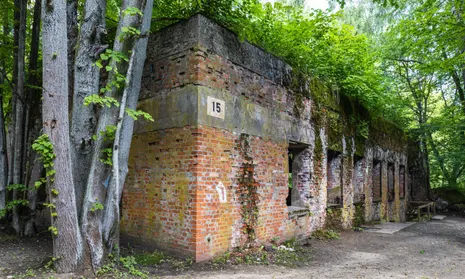
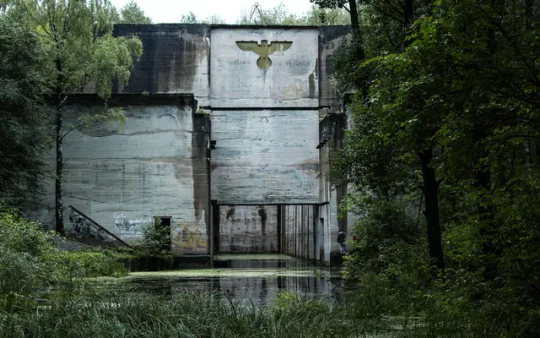
Five Human Skeletons Found Outside House of Nazi Leader Hermann Göring
Archaeologists have unearthed the skeletons of five people, missing their hands and feet, at a former Nazi military base in Poland.
They were discovered at a Nazi command center known as the Wolf’s Lair in Gierloz, northeastern Poland, after the group unearthed a fragment of human skull during a dig on February 24 and alerted local authorities, who decided to carry out further excavations.
The remains belonged to three adults, a teenager and a newborn baby, according to a statement from the Latebra Foundation, a historical organization based in the Polish city of Gdansk, published Thursday.
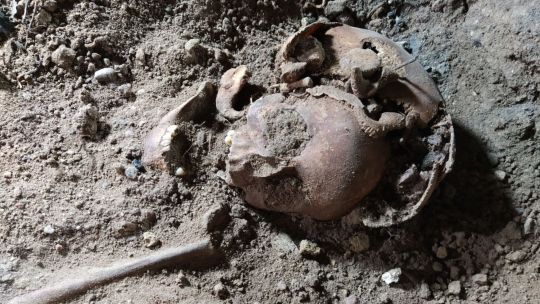
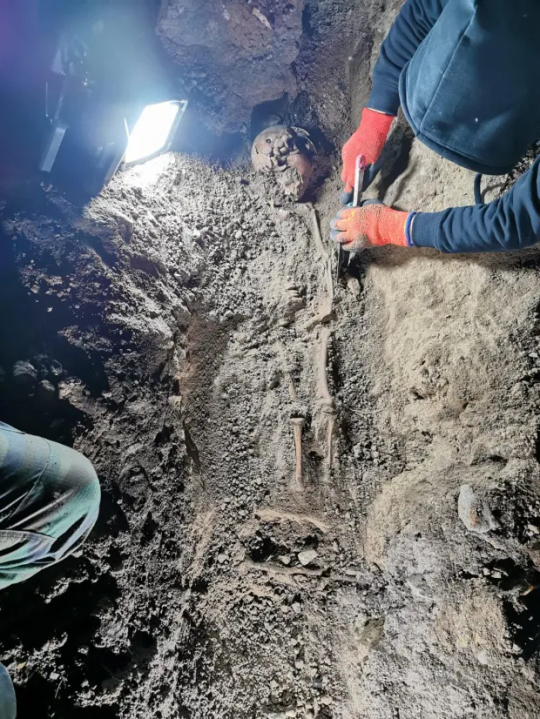
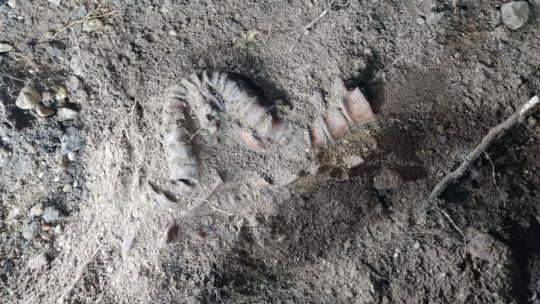
The five bodies were arranged near each other, facing in the same direction, outside a house occupied by Nazi commander Hermann Göring, an ace fighter pilot during World War I who became one of the most powerful Nazi leaders in World War II and a close friend of Adolf Hitler.
Alongside them were burned boards and the remains of sewage infrastructure, but there were no traces of clothing, according to the statement.
Adrian Kostrzewa, a member of the foundation’s board of directors, said that the team initially thought they were digging up an old bathroom when they found pipes under the ground.
However, they then found ashes and a burned key, before he found the skull fragment.
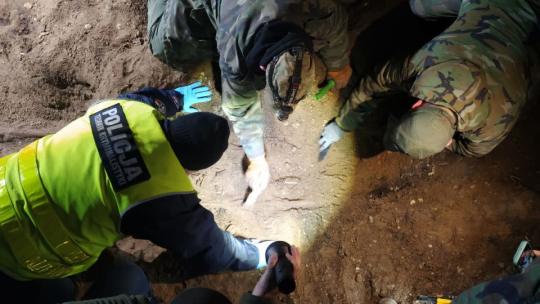
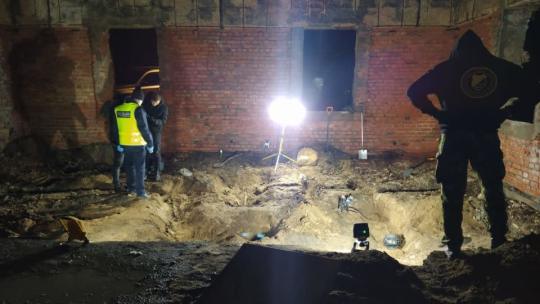
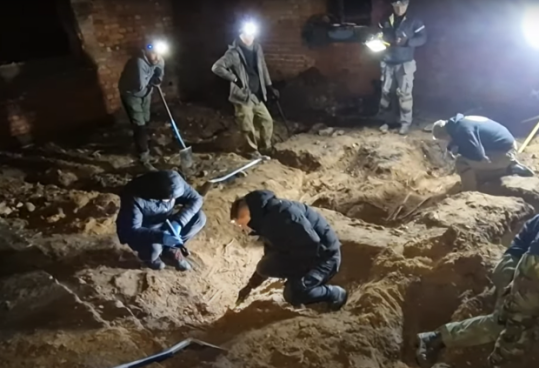
“It was very surprising,” he said.
The foundation is waiting to hear the results of a police investigation into the remains, and many questions remain unanswered.
“There are many theories (about) why they do not have hands and feet,” said Kostrzewa. “Right now, it’s very hard to say.”
An important next step is to find out the age of the remains using radio carbon dating, he added.
Deliberately built miles from civilization in the forests of northeastern Poland, the Wolf’s Lair was the Nazis’ 6.5-square-kilometer (2.5-square-mile) Eastern Front headquarters.
The base was one of the largest of its kind in Europe, according to the foundation.
“The uniqueness of this discovery lies in the fact that the bodies were found on the premises of the most heavily guarded complex of the Third Reich,” the statement reads.
Hitler spent nearly three years there in total.
The fortress was the site of Operation Valkyrie, an assassination attempt against Hitler in July 1944, before it was destroyed in January 1945 to prevent it from falling into the hands of the advancing Soviet army, according to the foundation.
By Jack Guy.
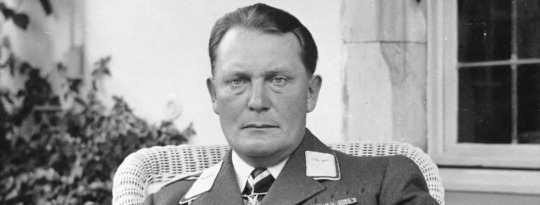
#Five Human Skeletons Found Outside House of Nazi Leader Hermann Göring#The Wolf’s Lair#Gierloz Poland#Eastern Front Headquarters#ww2#tomb#grave#artifacts#archeology#archeolgst#history#history news
15 notes
·
View notes
Photo
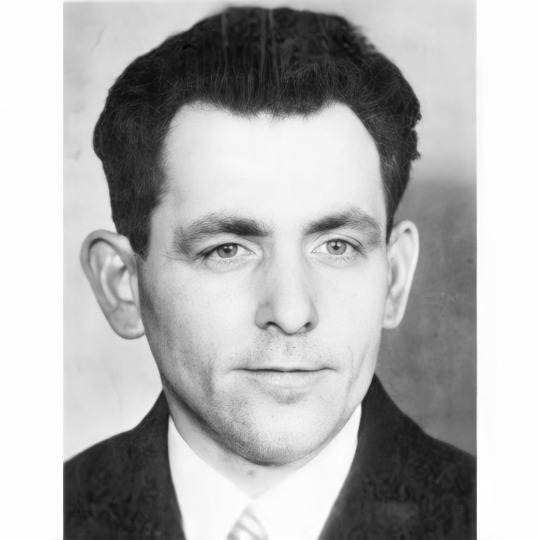
On this day, 8 November 1939, factory worker and folk musician Georg Elser attempted to assassinate German Nazi dictator Adolf Hitler. He bombed the pub where Hitler stayed every year on the anniversary of the Nazi putsch of 1923. Elser began work in an arms factory in 1936, and decided to try to kill Hitler. Under police interrogation he explained he made the decision because he believed Hitler was preparing to bring Germany into another war, among other reasons like how wages had been driven so low by the Nazi regime. In 1938 Elser began stealing small amounts of explosives from the factory where he worked, and knew that Hitler travelled to the Buergerbraukeller beer hall in Munich each year to celebrate the putsch. So he moved to Munich and attempted to get a job in the pub. In this effort he was unsuccessful, so he got a job in a quarry where he could steal more explosives, and began eating in the pub every day. Just before closing, he hid in a cupboard, and after everyone had left he began hollowing out a pillar to house a timebomb. He set it to go off at 9:20 PM on November 8, by which time Hitler had previously arrived. But on this occasion, unbeknownst to Elser, Hitler cancelled his stay and left just 13 minutes earlier. Instead the bomb killed six senior Nazis as well as a waitress. Despite torture, Elser refused to implicate anyone else in the attack, and he was sent to the Dachau concentration camp where he was murdered a few days before liberation. This event is one of many included in our people's history map. A test version is currently online exclusively for our patreon supporters. Support us and check it out here: https://www.patreon.com/posts/confidential-wch-74158281 https://www.facebook.com/workingclasshistory/photos/a.296224173896073/2129442323907573/?type=3
354 notes
·
View notes
Note
Helloo
If im not bothering you too much, may I ask what you know about the cia?
I know it may not be a question related to moon knight, or maybe it could be, but im kinda interested to know the basics at least and you seem to know a lot about it
Btw, i absolutely adore your blog
Hello!!! :D I'm so glad that you enjoy this blog and thanks for stopping by! Although, well,,,,hm,,,maybe it's just my rabid paranoia sinking its claws even deeper into me, but this is one of the more interesting asks I've gotten for this blog, that's for sure. 😅 For perhaps some context, I think anon might be referencing this post I made, gosh, close to two years ago now, where I got....maybe a little too excited talking about the history of the CIA and what Marc's time with The Company could mean for his character hahaha
Accordingly, a full rundown on the agency's history, not to mention its many, many facets, is probably a bit outside the purview of this blog, but this is then a good time to state that if anyone ever wants to talk about anything and everything besides Moon Knight, my dms are always open and I'm happy to chat!
However,,,I also have an affliction where I am an incorrigible pedant who jumps at the chance to write essays on things that interest me (and intelligence interests me very, very much, unfortunately). As such, while all my instincts are telling me this is absolutely glowing bait on a hook, if anyone wants to read a rambling wall of text about that agency Marc spent some time with, that will be waiting for you under the cut. Again, disclaimer, I'm just some person on the internet and thus can't really be considered a credible source on much of anything (except maybe how many times Moon Knight has teamed up with the Punisher hahaha). All the following info could easily be gathered from OSINT sources (and we're talking, like, Wikipedia, although this gave me the chance to pull out one of my favorite textbooks, Intelligence: From Secrets to Policy by Mark Lowenthal (vol. 7). If you're the textbook reading-type and interested in the topic, I'd suggest giving it a shot, particularly chapters 2 and 3 for the CIA and the U.S.' broader intelligence community). I tried to keep this incredibly surface level, as these are all topics that you could write monographs on, so if you want more sources/context, just hit me up! This also got,,,,unreasonably long (I didn't even know tumblr HAD a point where it would stop autosaving, but apparently trying to list all of the CIA's crimes against humanity will get you there), so I ended up having to split this across multiple posts.
Conception
I discussed it in my previous post, but I'll give a brief rundown on how the Central Intelligence Agency came to be. So, the United States had intelligence organs pre-World War II, but they would typically only be spun up for however long a conflict lasted and then all of their assets would be reintegrated back into the military, da? But then with the end of WWII ushering in the atomic age and nuclear deterrence pushing out conventional conflict in favor of an espionage-fueled Cold War, the U.S. government deemed it prudent to have a permanent intelligence gathering service. There was just one hiccup, the question of what to do with the U.S.' WWII-era intelligence service, the Office of Strategic Services (OSS). Under the leadership of the very descriptively nicknamed Brigadier/Major General William "Wild Bill" Donovan, OSS officers had been running around conducting sabotage and espionage operations throughout Europe and Asia, doing wild things like working with an underground intelligence network of European Catholic priests and coordinating with the 20 July plot/Operation Valkyrie assassination attempt on Hitler. They were the very definition of irregular, British officials accused them of "playing cowboys," and the U.S.' massive post-war military organization was loathe to have to find some way to force OSS officers into the military's necessary uniformity, so in 1947, after a couple years of bureaucratic shuffling, the OSS apparatus got pasted onto this new intelligence agency that was so far,,,rather bookish and the CIA as we know it was born. This divide, between the incredibly Ivy League analysts and the more martial remnants of the OSS that got folded in was a contributor to the two major branches of the CIA (and their infamous intra-agency rivalry), so this perhaps a good segue into the CIA's different internal departments, its "directorates."
There are the two ogs, the Directorate of Operations and the Directorate of Analysis, and then the newer Directorates of Digital Innovation, Support, plus Science & Technology. (Note: this is as the agency stands now; there have been some fluctuations in structure and naming conventions over the years).
The Directorate of Operations (DO) needs little introduction, as it's the legacy of the OSS and what most people think of when they hear the word "espionage," the kind of work one individual once described to me as "fast cars, nice suits, and unlimited spending" (hope he's still out there and doing well). They're your politically deniable boots on the ground collecting HUMINT (human intelligence such as handling contacts and the like) and executing covert actions. It contains the ultimate sharp point of the spear, the Special Activity Center (SAC) with its Political Action Group (PAG), which spreads black propaganda, influences elections, and conducts other psychological operations, and the Covert Action Group (CAG), which draws operators from the military's special forces programs to form their own direct action, counter-intel/counter-terror, unconventional warfare, paramilitary group (they have a very diverse set of martial skills). Naturally, most recipients of the U.S. intelligence community's highest honors, the Intelligence Star and Distinguished Intelligence Cross are from the SAC. Most of the stars on the CIA HQ's Wall of Honor, which memorializes officers who died in service of the CIA, represent SAC officers too, however.
The Directorate of Analysis (DA), in contrast, doesn't get enough love, despite making up nearly half of the CIA for decades. Whereas the DO mainly collects the intelligence through various means, the DA has the people who take the raw intel and try to turn it into something digestible for policy makers (whether that means just translating the intel into basic English or proposing whole, wide-sweeping policy strategies has varied across the agency's history depending on its professionalism and the degree of government oversight at the time). They get so overshadowed despite being a key part of the intelligence cycle, it's almost not funny hahaha (I kid you not, the official CIA website not only has a "kids" section with an online coloring book that depicts the various directorates as heroes, but it even went so far as to depict the DO with a rather dashing hat and cape,,,,while they gave the representation of the DA glasses and a briefcase, I weep hahaha). However, if you've ever heard a stereotype of the CIA actually being made up of a bunch of incredibly Ivy League, smart but cliquey, uncomfortably cold (both in manner and strategy) eggheads, that would be because of the DA. That's a very disparaging stereotype,,,,but it got its start from somewhere. It's still the CIA after all, and there have been times in the institution's history where the only thing to distract the DA from its intra-agency pissing contest with the more domineering DO was to shield the CIA from any sort of external government or other agency encroachment on the CIA's "purview."
Probably the next most established division would be the Directorate of Science & Technology (DST). Whereas the DO is predominantly HUMINT and the DA works closest with policy makers, the DST is the one expanding the CIA's technological capacity to deal with CBRN threats (chemical, biological, radiological, nuclear), and collect SIGINT (signals intelligence over radio waves and the like), IMINT (image intelligence as from satellites), and GEOINT (geological intelligence monitoring seismographs to, for example, detect if a nation is doing underground nuclear tests). Intel collection is only as good as the tools used and naturally intelligence agencies all around the world are constantly trying to leapfrog each other in capabilities, circumvention, and denial (preventing adversarial interest's collection efforts, that is).
Similarly, the most recent division is the Directorate of Digital Innovation (DDI), which is similar to the DST, but the DDI is focused almost entirely on cyberwarfare/espionage. They also seem to be doing a lot with OSINT ("open-source" intelligence, AKA any information you can access without a security clearance). OSINT used to be a bit of a joke in the intelligence community ("so, it's just what you read in the paper this morning??? That puts it one step above LAVINT: intelligence collected by overhearing conversations in the lavatory"), but with the explosion of information made available by the modern internet landscape and social media, you can go far with OSINT. (If you too salivate over the potential OSINT, maybe checkout Bellingcat if you haven't already)
Lastly but not least, there's the Directorate of Support, who are all the people who keep The Company running smoothly, managing logistics, comms, security at CIA sites, and overseeing officer training.
So yeah, I've alluded to the DA's and DO's rivalry, so maybe I should talk about inter- and intra-agency competition and the hot water those things have got the CIA in over the years. Maintaining an effective intelligence community is a tricky thing, particularly in a nation trying its best to be democratic and at least nominally respect human rights. You want officers to be able to collect intelligence, but you can't let them have so much free rein they rough up the nation's own citizens with impunity (as that's a bad look and can lead to civilian push back that could not only hurt the regime but handicap intelligence gathering in the future) and you definitely don't want an intelligence agency getting so much power it feels like it can start dictating a nation's policy instead of just advising on it. (Plus, the absolute nightmare scenario of an agency that's gone completely off the rails and no longer bothers much with consulting on politics at all, but just operates completely independently). Thus, to prevent the intelligence community from getting too big for its own good, a little competition, a little checks-and-balances from within the intelligence community can be beneficial. The drive by one intel group to outperform another (and consequently get more recognition/funding/etc.) can lead to a mutual improvement of the products that end up on a policy maker's desk. Having said that, I hope I explained it in such a way where you might see the issue with the CIA being the U.S.' singular, domineering force in the federal intelligence community for decades. The DA and DO had their marked cultural divide, but the CIA had very little competition from other agencies and, for example, had their ultimate weapon: the President's Daily (intel) Brief. The CIA, due to its vast capabilities, for years had the privilege of providing the president with (what the CIA deemed to be) the most important intel topics of the day. Accordingly, particularly during the Cold War before government oversight of the CIA really kicked up, this allowed the CIA to sway the government towards some at best politically questionable and more critically ethically deplorable policy choices.
Yeah, having gotten this far, I don't think I've made it clear that, for as much as I am fascinated by and spent,,,,a lot of resources studying subjects such as intelligence and terrorism, I am fully cognizant and never quite cease to be outraged by the injustice that permeates those fields. The CIA for sure, with its vast resources and the outsized role the United States played in meddling in international affairs during the Cold War and on, is a chief and, now, well-documented offender. I'm sure CIA intelligence collection and guidance has prevented many attacks we'll never know about, but you can't talk about the CIA without discussing the actions that directly resulted in thousands dead. Let's go over some of their greatest hits, shall we? (And that takes me so long I have to put it in a whole other post).
#Knight Mail#Not Moony#My GOODNESS is this not moony#yeah sorry this took so long anon and for how long it is as you can tell...I got excited#sorry everyone for straying from this blog's intention which really is just to post comic panels but when I have info I love sharing it#and this is unfortunately something I have a lot of info on#this is like barely half of what I've written too so I've got to figure out how to tack on the rest as the tumblr draft function#continues to fail me
11 notes
·
View notes
Note
do you know why there are so seemingly few pictures of hitler from the 1940s, compared to the 1930s? it kinda makes me sad :( i've read somewhere that he banned pictures being taken on him from 1943 onward but i don't know if that's true
I think there are several different reasons, and I do have quite a few photos of A.H. in my personal collection from 1943-1945, but at that time the war had drastically shifted in favor of the Allies, and less and less propaganda was being distributed as there was less positive news to report to the German public. Same with Hitler’s radio addresses, they became few and far between. His health was rapidly failing due to the stress, he also developed symptoms of Parkinson’s Disease and he was taking bizarre concoctions of drugs including methamphetimines just to function. This aged him rapidly, although I personally think he still looked pretty darn good in the summer of ‘44. Here is a couple photos of him getting a situation report the day after the Normandy Invasion on 7 June 1944. Most of the photos I have from this time period are mostly of Hitler looking at maps during military debriefings, which were obviously top secret at the time, hence less photos. Plus I’m sure he became increasingly more paranoid after the 20 July 1944 assassination attempt at the Wolfsschanze, although there are a series of photos of him visiting with the wounded in hospital later that day. He also gave a radio address to assure the public he had survived the attack. There is a very famous set of the last photographs of him taken when he emerged from his bunker on his birthday on 20 April 1945 as well, but yes it’s very sad there are so few from these last years of his life.
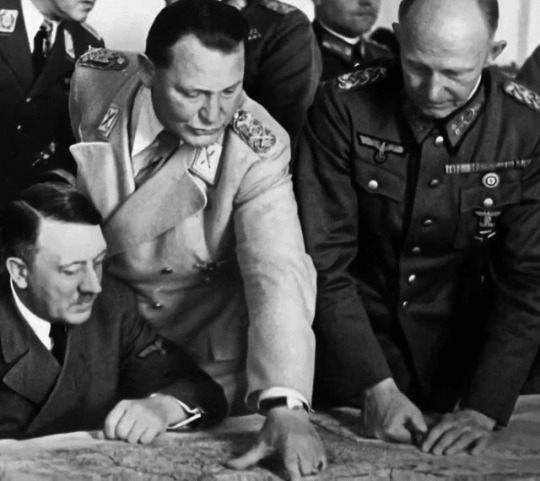
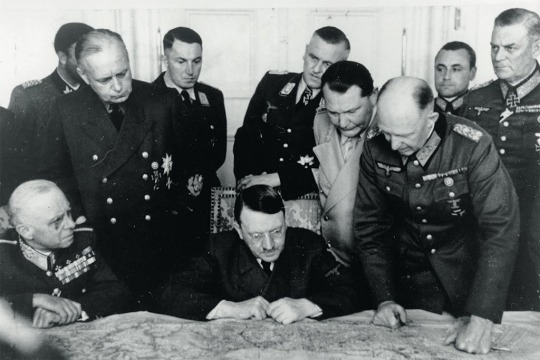
19 notes
·
View notes
Text
Powers of Eden (I)

Associated fandoms: Assassin's Creed x The Umbrella Academy
Pairing: Altaïr Ibn La'ahad x Reader (Platonic), perhaps some Altaïr x Malik in later pieces
Warnings: One (1) spoiler for The Umbrella Academy
Summary: The reader, who is similar to the "The Umbrella Academy" character Five Hargreeves, attempts to travel back in time. While it succeeds, they travel a lot further back than what they would've liked..
Add. Notes: Allow me to give some background on Five, for those who haven't seen the show: The original Five Hargreeves comes from an adopted family of 9. The siblings' names are Luther, Diego, Allison, Klaus, Ben, and Viktor, and his "parents" are Reginald and Grace. Along with his siblings, Five has superpowers, which in his case are teleportation and time travel. He used to work for a timeline related commission as an assassin. In this story, the reader/Five has no affiliation with the said Commission.
>✉️<
{ I've returned with a new piece! I'm pretty sure that I will write more parts for this, but I'm not sure how I should write a specific part related to languages without using Google Translate. So if any of you has advice related to that, I'd appreciate if you spare some for me. In any case, it looks like I managed to write something before St. Patrick's, so happy (still early) St. Patrick's Day! My so-called "spice" for this time is that I speak in English a lot more than in my mother tongue, which causes me to forget words in the latter language. }
-Eero, March 2023
Masterlist ✧*。
ー
When you were younger, you would practice teleporting –and on a few rare occasions, time travel– with Reginald's guidance, starting with a few small units at a time and then building up from that. On these very few occasions, he only allowed you practice time jumping to the future, and whenever you questioned him for that restriction, he would say things along the lines of "A wrong move down the line could change the whole world as we know it," "Time travel is far more complex than teleportation," and "You were not educated enough to understand time travel."
Even if what the older Hargreeves had explained to you these days was true or not, he wasn't just a prick, he was the whole cactus. Today felt like a good day to not listen to what he had told you, just to spite him. It wasn't like Reginald was going to stop you anyway; He was dead, "playing tennis with Hitler in hell," as Klaus said before his funeral.
You told Grace and Viktor about what you were going to do, even though they weren't going to know that when you meet them yesterday, the day you planned to jump back to. You strutted to the Umbrella Academy's courtyard, where after two attempts you successfully opened a way through time.
Except, when you stepped through the ripple of time and looked for signs that you actually time travelled instead of teleporting in an arduous manner, you realized that you weren't in the Academy's courtyard anymore.
You were standing on the roof of a small, sand-colored building. You could see a city around you, with a bunch of houses and towers in different shades of yellows and whites. You recognized a large building as you took in your surroundings; a blue and white temple with a gold dome acting as its roof. With the famous temple in mind, you easily concluded that you somehow ended up in Jerusalem.
Once you came out from your daze of admiring the landscape around you, you realized that a hooded man dressed in white was behind you, staring bullets into your head. You wanted to tell him about what happened to you, but given your location, you doubted that he would understand you.
The assumption ended up being correct, because he began speaking in an unrecognizable language. The only useful thing you could do in that situation was gesturing to him that you didn't understand him, which was exactly what you did. Some gears seemed to align for him, and as a response he took you by the arm and into the building below you.
The two of you landed on the floor of what seemed to be an outdoor living room. You couldn't really take in many details, since the strange man continued dragging you through the building. The room you stopped in had a collection of bookshelves, baskets, pots, and many other things, but what caught your eye was a one-armed man standing behind a table.
The cripple noticed you the moment you and the hooded stranger walked in, and began to question the latter about you. They talked for a short period of time, then the man behind the desk walked away from the table to you and the other strange man.
The two men turned to you, and tried to introduce themselves in the most simplest way they could to someone who didn't understand their language; they pointed at themselves and said their names. The now formerly hooded man introduced himself as Altaïr, and the other one with a dark robe over his similarity white outfit introduced himself as Malik. You told tell them your name in the same manner; you pointed at your torso and said "(Y/N)."
Altaïr looked at the other man and said something in his language, to which Malik chuckled and made another comment as a response.
("A name. That's a start.") ("What a funny name. You certainly weren't wrong about the 'odd person' part.")
The two began brainstorming on what they should do with you now; they couldn't let you leave the bureau, because you didn't understand their language, you likely had no idea what the surrounding world was like, and you looked like someone out of a bizarre story told by a drunk bard. All they could think of with the given circumstances was that they needed to take you in.
Malik went to one of the shelves in the room, and began looking for books that could possibly help with the language barrier. You joined him to look for documents with dates on them; you needed some year written on a recent paper, to get an idea of how far back in time you actually jumped.
Altaïr realized what you were doing, and found some excess paper to write down the year for you. You took the paper and thought that you wouldn't be surprised about the year, since their appearances seemed to give it away. Yet, you were very surprised, even for someone who just time travelled on purpose. You had jumped into the period of the Third Crusade.
You quickly recovered from the shock that came with that fact, and wrote down "2019" onto the other side of the paper Altaïr had given you. You gave the paper to him for both him and Malik to see. The two froze in place, and Altaïr dropped the piece of paper onto the ground. They turned to look at you again, and visibly wanted to ask multiple questions about the future from you; you could see the eagerness on their faces. Unfortunately, the language barrier was no help.
The presence of an inability to communicate with you made the two white-clothed men determined to try and teach you their language while you were under their wing.
For a change of scenery to let you process what happened, Altaïr took you back to the main area of the building, where he sat you down. He walked into a third room to get you some food, after Malik had left you two alone to find you some clothes that would help you blend in—to make it less obvious that you've come from 900 years into the future.
As Altaïr handed you some food, Malik came up to you two and placed a small stack of clothing next to your legs. He muttered something to Altaïr in their foreign tongue as he was walking back into what you concluded was probably his office.
("If they need help with the clothes, you can count me out.")
Since the building usually didn't have any visitors of your kind, majority of the spare clothes were related to what seemed to be their uniform. The clothes Malik had provided you included a pair of dark pants, some white robes similar to the ones Altaïr was wearing, and plain boots fit for running and climbing, along with a leather harness to keep the clothes in place. Those clothes obviously weren't what you were used to wearing, but they were relatively better than the ones you had on at the moment.
You left Altaïr alone into the main area to go change into the robes. Only after you had changed you realized that your clothes looked like a downgraded version of the two men's outfits. You concluded that the clothes they wore had different features based on ranks. You didn't even know what kind of organization they worked for or what their jobs were, so you couldn't put more thought into the conclusion that you had just made.
As you got back to Altaïr, you only then felt the exhaustion from the energy-consuming time jump kick in. Even if you would've had enough energy to try time-jumping again, you wouldn't have wanted to risk accidentally travelling into the Stone Age. The little "living room" seemed comfortable enough to be used as a bedroom, which was the reason why you lied down in the bundle of pillows that were sitting on the ground.
The white-clothed man briefly disappeared into another room and returned to get you a thin blanket. As you prepared to rest, Altaïr sat down to begin contemplating on the things he could try to do in order to help you adapt to a possible life in Jerusalem. Thanks to a sheer lack of ideas, he only thought of recruiting you as a novice for the Assassin Order.
Now that you had fallen asleep, Altaïr went to Malik to consult him on what they should do.The latter thought that recruiting you—a strange person who literally emerged out of nowhere and couldn't even speak their language–into the Order was an outrageous idea that should be out of question. The dark-coated man also added that they couldn't even take you to Masyaf to swear you in and train you there because of the language barrier. But even then, their morals told them that teaching you was the best they could do with the lifestyle they had.
The two decided to show you a little thing or two about being an assassin, without making you an official member, and see how it would go. Malik proposed that he would teach you their language whenever he could multitask, and Altaïr added that he could show you a move or few while he trained or when he brought you along for an info hunt. All they could do now was to wait for you to wake up and get ready for a bring-your-novice-to-work day with the two men.
ー
Personal pointers: A particular bureau for Assassins that Altaïr frequently visits in certain fanart is in Jerusalem, since Malik is the Rafiq there. Like majority of the buildings in that city, the hideout is in the color of sand and maybe a few specific spices.
#assassin's creed#altaïr ibn la'ahad#malik al sayf#altaïr x reader#platonic#eero's fics#assassin's creed x reader#assassin's creed fanfiction#altaïr#ac altair#assassinscreedseries#assassins creed#ac crossover#umbrella academy crossover#five hargreeves#five hargreaves
59 notes
·
View notes
Text
Day Sixteen
Haytham Kenway would forever come to hate the day before his son Desmond’s birthday. He had been in the area, attempting to perhaps work with William Miles, to give the modern assassins an edge over the modern templars. It is why Haytham did not come alone. His father Edward Kenway was present along with Charles Henry Lee, Jeremiah Scudder, Nicholas Biddle, Christopher Gist, Jack Weeks, Shay Cormac, Matthew Davenport, and Victor Wolcott. The nine had their orders to remain civil with the assassins despite the tension. Everyone of the nine, except Lee, liked Desmond who was very respectful to them despite them being Templars. It seemed as if the boy realized peace between their factions would be better than no peace. However, as much as they tried, William’s actions would prove to them that he was unworthy of their aid and cooperation.
Adéwalé had been the first to alert them that evening that William had gone nuts over the fact that Desmond simply held a different view than him. Haytham, despite his growing anger, calmly asked.
“Come again?”
“Mentor Miles was telling Desmond that he should always be wry of his enemies and those he calls allies. There is always someone looking to stab you in the back. Desmond retorted ‘what we even can’t trust your friends?’ Mentor Miles replied ‘Assassins can not have friends. It is a weakness. Family is a weakness.’ He then procced to trash Altair in front of Desmond, who did not take it well and called him a conspiracy freak.”
Haytham’s eye twitched. He knew William was very temperamental. Without another word the ten templars, along with Adéwalé dashed off to the barren dirt ring the assassins used as their training arena. Adéwalé grew up a slave, so he’d seen worse than poor when it came to conditions, and this was somehow worse than that even. Never mind the fact that the sight that had met them was degusting. William Miles was atop Desmond, who was bleeding from a deep gash on his face, pulling his non-dominant arm behind his back as a means of control, looking for an apology to the sleight of being called a conspiracy freak, and that Desmond dared to have any opinion. Let alone suggest that Assassins should have friends and family. He’d tare the arm from it’s socket if he had to. Yet he did not see a very angry Haytham charge at him.
That fight had been decidedly one sided. However, Desmond was in severe pain. Half his body felt numb while the other half screamed in agony. The sharp, burning sensation was all he could focus on. Panic slowly took over as, for a moment, a way out of this pain began to seem more and more unrealistic. The road ahead was a tough one and right now he wasn’t sure whether he were willing to walk it, let alone whether he was able. He was shocked the moment when Edward Kenway picked him up and rallied the other eight around him saying.
“Jeremiah Scudder, Nicholas Biddle, Matthew Davenport, and Victor Wolcott with me. The rest of you assist Haytham.”
“Yes sir.”
They had all said. Jeremiah Scudder was pretty much the order’s equivalent to a Rafiq or Dai in the assassin brotherhood. A spy master who used his business as a merchant as a front that often funded money into the order. He was German and proud of it, often getting along with Edward with their parchment for strong drink. He however detests infamous Germans like Adolf Hitler and their narrow views on the world. Nicholas Biddle, is a competent sailor who recently earned the honor to captain the restored Jackdaw. Something he takes very seriously because he knows from his own experience what it is like to own a formidable ship. American he also gets along with Edward, since the man entrusted his first baby to him. Matthew Davenport is cold and calculating, he serves in his role fiercely, and is extremely loyal to his men, fighting with equal skill to that of his fine strategizing. He stands firm and strong eyeing the son of the Grandmaster in the arms of his grandfather, twitching in pain, struggling to keep from crying out in pain. Matthew with a bit of fatherly instinct leaking in encouraged.
“Let it out lad. Pain is natural, so is the reaction and want to scream and cry. It feels good sometimes too.”
Desmond looked at him and only whimpered. Adewale looked from the boy to Matthew and said.
“That maybe the best you get out of him. He’s broken spiritually.”
“Understood.”
Matthew said. That left Victor Wolcott, a man after Garnier de Naplouse’s own heart who like the mad French Crusader was infamous for his experiments. That being said though he did not do those things on his fellow templars. And he was gentle in quickly getting an idea of what needed to be done to help Desmond recover. They got to their vehicle, a van, and got in and drove off with Desmond being tended to in the back. It took them roughly three days to reach the Chateau that Haytham Kenway owned and used as both a home and the base of their Templar activities. Once they had arrived, Edward carried Desmond inside, where Tessa was waiting with medical supplies. She and Victor worked together to clean up and bandage any wounds on the poor now sixteen year old boy’s body. Edward sat up with his sleeping grandson to ensure someone was there should the boy wake. He’d done it when Haytham had been sick in the past and now he would again. He turned his head only when Haytham, accompanied by Connor, surprisingly, walked in. Haytham smiled softly, a bruise clear on his face from a lucky shot from William that, from the bruising on Connor’s nucleus, sent Connor into a fury that the goal mentor dared lay a hand on his father. Haytham spoke softly.
“Thank you, father, for staying with Desmond.”
“You are welcome son. He was in shock most of the way here. When he was stabilized, he passed out and has been out since.”
“For the best, I suppose. It will allow his body time to heal.”
There was silent agreement as Haytham took over, Edward went to bed, but not before acknowledging his older grandson. Connor walked with Edward to ensure his grandfather didn’t hurt himself on the way to bed. Connor then set to stalk the halls to ensure no one dared bother these men whom he’d come to view as part of his strange family.
#assassin's creed#writing#desmond miles#assassins creed rogue#change the course#haytham kenway#edward kenway#other templars#william miles#adewale
5 notes
·
View notes
Text
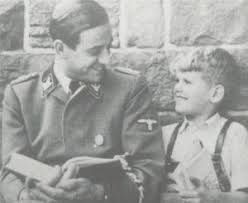

These are some facts and curiosities about Karl Brandt, the head of the Aktion T4:
He was born on 8th of January, 1904 in Alsace.
He began his studies in 1924, at the University of Jena, and in 1928, at the age of 24, he became a doctor.
A young doctor when he joined the Nazi party in 1932, he placed his hopes in the party for the recovery of the Alsace region, which in the meantime had returned under French rule (in 1919). A very important role in the formation of his thought was played by an Alsatian like him, the Nobel Peace Prize winner Albert Schweitzer, whose work as a missionary in Africa he however could not join for political and military reasons.
In 1934, at the age of just 29, he became the Führer's personal doctor . The conflict between the two was always quite heated. In fact, while Hitler's official doctor, Morell, was considered a charlatan, Karl Brandt was the scientific figure and traditional doctor of the Reich.
He was the man chosen by Hitler as the initiator of the T4 Program (the killing of disabled Germans) and as his supreme medical authority.
With these authorities, he was involved in roles of maximum responsibility in the sadly famous "scientific" experiments on human beings, including the one in which he himself asked the ReichsFührer, Heinrich Himmler, for authorization to carry out inoculations of the epidemic hepatitis virus in human beings.
He and Albert Speer were not only close friends, but also acted to save each other's lives. In 1944, Brandt used his enormous powers as General Commissioner of Medical Services and his friends to save the already ill Speer from Himmler's assassination attempt. Subsequently, on April 16, 1945, Brandt was arrested by the Gestapo and sentenced to death, as he was accused of high treason against the Führer. But on May 2 he was released by order of Karl Dönitz. In fact, upon hearing the news of his friend and colleague's arrest, Speer had the urgency to mobilize various people to save his life.
Brandt entered into what many think of as an adopted son relationship with the Führer himself.
François Bayle, a French psychologist who interviewed him repeatedly at the time of the Nuremberg trials, described him thus:
«Rich, vigorous, but undisciplined, pugnacious and childish personality made vulnerable by his ambition and pride. Possessed of a vivid intelligence, but little logical clarity and much imagination, which can easily be influenced and led astray. His character could also be influenced, just as easily."
He was tried from 9 December 1946 to 19 August 1947 with twenty-two other doctors at the Nuremberg Palace of Justice
Karl Brandt was found guilty of war crimes, crimes against humanity and membership of an organization declared criminal by the International Military Tribunal and sentenced to death by hanging.
Sources:
Wikipedia: Karl Brandt
Military Wiki: Karl Brandt
The Nazi Doctors by Robert Jay Lifton
❗❗I DON'T SUPPORT NAZISM,FASCISM OR ZIONISM IN ANY WAY, THIS IS AN EDUCATIONAL POST❗❗
31 notes
·
View notes